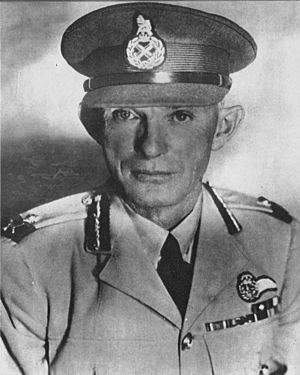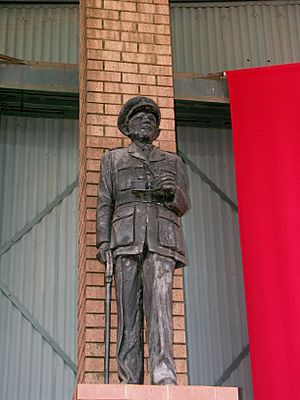Dan Pienaar facts for kids
Quick facts for kids
Daniel Hermanus Pienaar
CB DSO & two bars
|
|
|---|---|
 |
|
| Nickname(s) | Dan |
| Born | 27 August 1893 Ladybrand, Orange Free State |
| Died | 19 December 1942 (aged 49) Kisumu, Kenya |
| Allegiance | |
| Years of service | 1911–1942 |
| Rank | Major General |
| Service number | 126242 |
| Commands held |
|
| Wars | |
| Awards | |
Major General Daniel Hermanus Pienaar (born August 27, 1893 – died December 19, 1942) was a brave South African military leader. He played an important role during World War II. People often called him "Dan."
Contents
Early Life and First Steps in the Military
Dan Pienaar was born in a place called Ladybrand in the Orange Free State. He grew up in Natal. His family had fought against the British in the Second Boer War, a big conflict that happened before he was born.
In 1911, when he was 18, Dan joined the artillery part of the Natal Mounted Police. Artillery means he worked with big guns. A few years later, in 1913, he moved to the Union Defence Forces (UDF), which was the main army of South Africa.
During World War I, Dan served as an artillery soldier. He fought in different places like South West Africa and German East Africa. He was mentioned several times for his good work. Later, he also served in Palestine until 1918. He finished the war as a junior officer in the British Army.
Between the Big Wars
After World War I ended, Dan Pienaar returned to South Africa and rejoined the Union Defence Force. He became an officer and went to England for special training. He learned how to lead a group of artillery guns and also took a course for staff officers, which teaches how to plan military operations.
In 1922, he came back to South Africa and was promoted. He became the Adjutant of the South African Field Artillery. This meant he helped manage the artillery forces. By 1930, he was a Lieutenant-Colonel, leading a brigade in Ladysmith. He also commanded military areas like the Orange Free State Command and the Transvaal Command. Just before World War II began, he was promoted to Brigadier.
World War II Hero
When World War II started, Dan Pienaar showed his great leadership skills.
Fighting in East and North Africa
From 1940 to 1941, during the East African Campaign, Brigadier Pienaar led the 1st South African Infantry Brigade. His brigade fought in important battles like El Wak, The Juba, Combolcia, and Amba Alagi. After the battle of Amba Alagi, his brigade was sent to Libya to continue fighting.
In 1941 and 1942, during the North Africa Campaign, Pienaar and his troops fought in tough battles like Sidi Rezegh and Gazala. On March 10, 1942, he was promoted to Major General. He then became the leader of the South African 1st Infantry Division. He led this division in the Battle of Gazala, during a retreat to Egypt, and in the defense of El Alamein. He also led them during the Second Battle of El Alamein, a very important battle.
Dan Pienaar was recognized for his bravery and leadership. He received the DSO twice. He was also mentioned in official reports twice for his service in North Africa. After the victory at El Alamein, he famously said that the enemy general, Erwin Rommel, would "never dine in Cairo - unless as a tourist." This showed his confidence and determination.
A Leader Who Cared for His Men
During the war, Dan Pienaar was known for caring deeply about his soldiers. He sometimes disagreed with his senior commanders if he felt they were not paying enough attention to the safety and comfort of the soldiers on the ground. He believed in protecting his troops.
For example, during the early part of Operation Crusader, a South African brigade suffered heavy losses. This made Pienaar very careful about committing his own troops to risky attacks. He sometimes chose to hold his position or move slowly if he believed it would protect his soldiers from unnecessary danger. Even though this sometimes caused tension with his superiors, he was never officially punished.
He was also critical of some British military tactics that he felt led to too many losses. He once said that he hated how some British leaders would "squander a complete armoured brigade in some useless assault." He preferred a more cautious approach that saved lives.
On November 20, 1942, he was awarded the Companion of the Order of the Bath (CB). This was to recognize the amazing bravery and achievements of the British and Dominion troops and their commanders in the Middle East.
Awards
His Tragic Death and Lasting Memory
In 1942, Major General Pienaar was tragically killed in a plane crash. He was on his way back to South Africa from the war. The accident happened early one Saturday morning in Kavirondo Gulf near Lake Victoria in Kenya. Eleven other South African officers and men also died in the crash.
The plane crashed about 16 kilometers from the airfield at Kisumu. It was believed that the pilot was tired, and there was an electrical problem with the plane's landing gear. This caused the plane to lose speed and crash into the water.
Dan Pienaar was survived by his wife, Norma, and their three children: Nelia, Barry, and Fay.
Many people remember Dan Pienaar as one of South Africa's most popular and inspiring military commanders. To honor him, an infantry regiment (a type of army unit) was named after him. The exhibition hall at the South African National Museum of Military History also bears his name. Even a suburb in his home city of Bloemfontein is called Dan Pienaar.
A war correspondent named Sam Brewer wrote that Pienaar was "one of the best fighting leaders the British have found in this war." He also said that Pienaar was "loved like a father by his men." This shows how much his soldiers respected and admired him. Many streets across South Africa are also named after him, in cities like Aliwal North, Port Elizabeth, Queenstown, Nelspruit, Middelburg, Volksrust, Bloemfontein, Ladybrand, Pretoria, Centurion East, Florida North, Florida Hills, and Stellenbosch.
See also
- 1st Infantry Division (South Africa)
- East African Campaign (World War II)
- Western Desert campaign
Images for kids
 | Kyle Baker |
 | Joseph Yoakum |
 | Laura Wheeler Waring |
 | Henry Ossawa Tanner |




